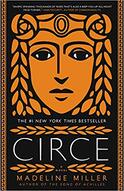Sacred Chickens
Menu
SACRED CHICKENS
 Circe Author, Madeline MIller by Jarad Johnson Ok, right off the bat, we have to establish something: I like reading about witches. In fact, if there are any themes in my literary tastes, this is one. I had a fascination with witches as a child (my theory is that I liked them because I was raised by powerful women) and that interest has merged with my academic career. It’s an interesting crossroads of books, horticulture and witchcraft (I never said I was going to do this the conventional way). Any book about witches is one that I’m probably going to read. I’ve reviewed several for the blog and read many more than that. We recently published a paper that I wrote about witches and the plants that they use (here’s my shameless plug for that because it’s actually very good). So, we have that out of the way. Point being that I’ve read a lot of books about the same topic, and they can become somewhat formulaic. After you can start to feel like you’re reading the same book- cauldrons, magic, broomsticks, burnings- all that can kind of blur together after a while. Circe stands out to me among the books I’ve read about this topic. It’s one of the best books that I’ve read in some time- epic in scope, direct and concise, but also beautifully written. Miller is very good at what she does, and her story here is masterfully written. Sometimes, a story contains lots of beautiful language and the author impresses you as a word smith, but it doesn’t stick. I think of those books like butterflies- objectively beautiful, but with no permanence. None of us are given enough years in our lives to read books that aren’t meaningul (or Moby Dick…just saying). And I have little patience for beauty without substance. Ultimately, I judge a book by its story. I see no other way to do it, actually. The story in Circe holds up. To me, a good book reads like flowing water- neither hurried nor lagging, flowing toward an eventual end, movement with purpose, leaving behind green fields and harvests as it moves to the sea. This book is essentially a retelling of a few Greek myths from the perspective of Circe, the Witch of Aiaia. She is immortal and encounters several famous heroes and monsters- the Minotaur, Odysseus, the Olympians and the Titans, amongst many others. Circe’s perspective is one that was uncommon among her female peers- she desired independence and knowledge and was neither a willing servant nor concubine. She was not a powerful Titan- she was born to the titan Helios and her bloodline was that of the lower classifications of nymphs. She discovers her talent for working with plants (termed “her witchcraft”) by accident. A rather large accident, as is the way with Circe. She uses a certain plant on a rival, and creates the monster known as Scylla. Quite the learning curve! And I always thought there were no real garden mistakes besides planting a willow over you plumbing. Circe learns very quickly that the world she lives in and tries to exist in is not made for her; in fact, it disadvantages her to the point of degradation. She is banished to Aiaia, but manages to turn even that to her advantage. She would otherwise have been married off to a repressive and misogynistic husband. Witches, by definition, are women that have knowledge and power that threaten men and challenge their fragile authority and Circe is just such a force of nature. I know this is a book review, but we must take a moment – and a paragraph – to appreciate the plants of the novel. Circe has a garden around her house on Aiaia in which she grows everything- vegetables, herbs, flowers- you name it, she’s got it. I automatically like and respect her because of that. Gardeners are usually good people, and they have a respect for the earth that I think society at large should have. Lots of plants are mentioned in her witchcraft- hellebores, jessamine, every flower, root and sap had a use for her. Plant fiends are my kind of people! At the moment I’m writing at the kitchen table (and one of my cats is making a godawful racket. You’ve been fed four times today! Silly creature). Besides my laptop, the table is covered in plants. Rosemary, mint, and a Chinese evergreen. This time of year is houseplant season for me, and much to my mom’s consternation, plants are appearing on every surface. For me, a mere mortal, some of them have uses and some of them don’t. Most houseplants are highly toxic, but the idea that every plant has a use greatly appeals to me. Perhaps the gods will bless me with that ability one day. Hopefully, like Circe, I can be banished to my own island as well. Now we continue the book review. Circe has been set up as a figure of feminine power, but a defining moment for her is a tragic one. She lets sailors into her home, thinking in her lonely state that they be good company for her, and they rape her after they drink her wine and eat her food. You should know that if you’re going to read this book, because it can be graphic for some people. But it’s important, because at every step of the way Circe has had her agency and choice taken away from her. When she was a child, she wasn’t given the choice to learn or be anything other than subservient. When she was banished, she wasn’t given any choice in that either. At every stage of her life, she has been constantly reminded the power men and gods hold over her, and this is the ultimate expression of that. As is often the case, her entire worldview is changed after that. This is why Circe turns men into pigs. One of the things I really like about this novel is that Circe is a female character that is classically seen as a villain. Gotta love that classic demonization of women! Like most legendary witches she’s a scapegoat. The novel turns this on its head. We see Circe as human in her sentiments and motivations, not just a villain. Someone trying to make the best of a world that she doesn’t quite fit in. A woman with enormous power who challenges the dominant power structures simply by being who she is. One of the things I like about Circe in this novel is that she isn’t really egotistical at all. If something doesn’t work, she learns and adapts. She is constantly adapting, constantly evolving. I loved this novel. Loved the way it was written, the messages it presented, and the story of course. And the plants. Plants, like tea, make everything better. Greek mythology has always been an interest of mine, but I like this new perspective that Miller gives. The classic tales show us heroes that supposedly surpass humans in their strength, with, or godliness. Circe, however, is a hero precisely because of her humanity. That’s quite a difference.  Bio: Jarad is the co-administrator and writer for Sacred Chickens, attends college at MTSU, loves tea and coffee, and tries to spend every spare second reading. He recently developed an interest (some might say obsession) with gardening. Jarad is an English major with a concentration in literature. Bless his heart! Let's all light a candle for him and send him happy thoughts!
0 Comments
Leave a Reply. |

Click Photo above to buy ebook or paperback from Amazon.
Here's the link to Barnes and Noble Or order through your favorite independent bookstore! Categories
All
|
 RSS Feed
RSS Feed